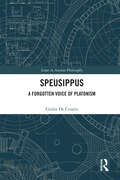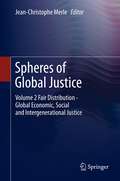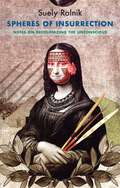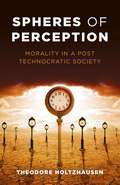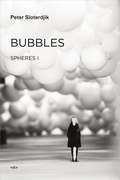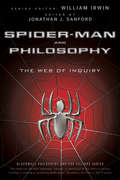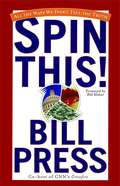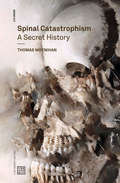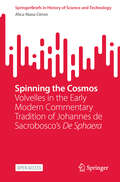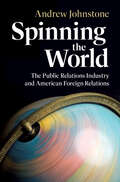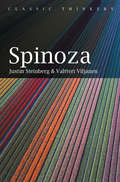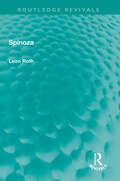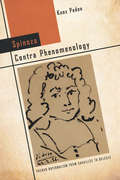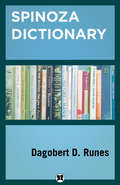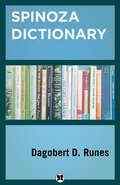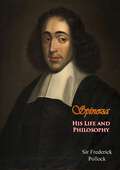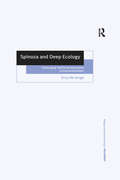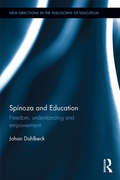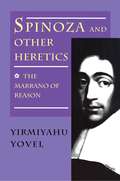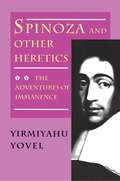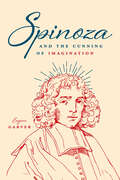- Table View
- List View
Speusippus: A Forgotten Voice of Platonism (Issues in Ancient Philosophy)
by Giulia De CesarisThis volume, the first devoted specifically to Speusippus in English, offers a new picture of Speusippus’ philosophy via an in-depth analysis of the testimonia preserved by Aristotle.The book develops a new methodology for understanding the evidence concerning authors of the Early Academy, Speusippus in particular, providing a fresh assessment of the initial phase of Platonism, which calls into question the long-held view that Speusippus was a distinct outlier among Platonists. By reconstructing discussions within the Academy, looking at Aristotle especially, we can better understand the presence of Speusippus’ doctrinal deviation from or preservation of Plato’s doctrine as the effort of a genuine Platonist – the first – to re-shape his Platonic credentials in the backdrop of Aristotle’s critiques. In offering a new reconstruction of the philosophical views of Speusippus, the book provides new points of departure for research on the Early Academy and challenges previous ideas regarding the early development of Platonism.Speusippus: A Forgotten Voice of Platonism is of interest to students and scholars of Speusippus, as well as those working on Platonism, the Academy, and ancient philosophy more broadly.
Spheres of Global Justice: Volume 1 Global Challenges to Liberal Democracy. Political Participation, Minorities and Migrations; Volume 2 Fair Distribution - Global Economic, Social and Intergenerational Justice
by Jean-Christophe MerleSpheres of Global Justice analyzes six of the most important and controversial spheres of global justice, each concerning a specific global social good. These spheres are democratic participation, migrations, cultural minorities, economic justice, social justice, and intergenerational justice. Together they constitute two constellations dealt with, in this collection of essays by leading scholars, in two different volumes: Global Challenges to Liberal Democracy and Fair Distribution. These essays illustrate each of the spheres, delving into their differences, commonalities, collisions and interconnections. Unlike many writings on global justice, Spheres of Global Justice does not content itself with describing the painful and advantageous effects of the globalization process as being ipso facto a global injustice or a just global order. Rather, this multidisciplinary collection of essays, from a pluralist inspiration, combines empirical analysis with theoretical approaches and ethical principles, paying close attention to two aspects of the effects of the globalization process. These aspects are the causal relationships that lead to such effects and the kinds of obligations, or of normative relationships between global rights and correlative duties, that applies to each specific individual case. This volume illustrates how diverse global obligations are, and how they can be, grounded in diverse relationships (identity, ability to provide help, causal responsibility, past injustices, protection of agency and promotion of independence, etc.). These essays also demonstrate that an ethical global approach has not only international or transnational, but also domestic, local and interpersonal dimensions.
Spheres of Insurrection: Notes on Decolonizing the Unconscious (Critical South)
by Suely RolnikAs the globalized regime of neoliberal capitalism consolidates its grip on the world, it refines the micropolitics proper to the capitalist system and makes it more perverse. This micropolitics involves the appropriation – what Suely Rolnik calls the “pimping” – of life, as it turns the life drive itself away from creation and cooperation and towards the deadening, destructive practice necessary for capital accumulation. This dynamic is the engine of what Rolnik calls the colonial-capitalistic unconscious regime. She also identifies the conditions necessary to fight against this regime – namely, a reappropriation of the life drive, the energetic basis at the heart of all life forms, human life included, and the principal source of extraction for capitalism. Drawing on examples from across the Americas, including Brazil and the United States, Rolnik examines the circumstances that have given rise to regressive, reactionary governments throughout the world. These circumstances include, at the macro level, an alliance between neoliberalism and extreme conservatism and, at the micro level, a crisis of the hegemonic subject in the face of the emergent empowerment of marginalized communities that practice other modes of subjectivation. This crucial book by one of the most prominent intellectuals in Latin America today will be of great value to anyone interested in contemporary politics and social struggles.
Spheres of Perception: Morality In A Post Technocratic Society
by Theodore HoltzhausenOur economic system is over-stimulated by the information age. Interconnection aids and abets companies earning trillions and their swift rise to global dominance. The 24-hour wired world has led to increased volatility; negative information, and even an accidental computer glitch can crash the market and create panic. Health, the environment, the welfare of society are pushed to the far edge of national interests. Instead, GDP and short-term monetary profit is prioritised over long-term impact on society and the environment. The world as we know it is set for collapse. Simultaneously, the science of evolution has itself evolved. In as much as &“survival of the fittest&” has been used to justify harsh, competition behaviour on the part of individuals and corporations, an updated understanding of evolution now tends to tell us a different story. What if written into the code of our DNA and RNA is a guide for telling us how to evolve morally and as a result improve our world and progress our epistemology? From such an understanding emerge new Spheres of Perception.
Spheres: Bubbles Microspherology (Semiotext(E) Foreign Agents Series #Vol I)
by Peter Sloterdijk Wieland HobanSloterdijk describes as a general theory of the structures that allow couplings or as the book's original intended subtitle put it, an "archeology of the intimate." Bubbles includes a wide array of images, not to illustrate Sloterdijk's discourse, but to offer a spatial and visual "parallel narrative" to his exploration of bubbles.
Spider-Man and Philosophy
by William Irwin Jonathan J. SanfordUntangle the complex web of philosophical dilemmas of Spidey and his world--in time for the release of The Amazing Spider-Man movieSince Stan Lee and Marvel introduced Spider-Man in Amazing Fantasy #15 in 1962, everyone's favorite webslinger has had a long career in comics, graphic novels, cartoons, movies, and even on Broadway. In this book some of history's most powerful philosophers help us explore the enduring questions and issues surrounding this beloved superhero: Is Peter Parker to blame for the death of his uncle? Does great power really bring great responsibility? Can Spidey champion justice and be with Mary Jane at the same time? Finding your way through this web of inquiry, you'll discover answers to these and many other thought-provoking questions.Gives you a fresh perspective and insights on Peter Parker and Spider-Man's story lines and ideasExamines important philosophical issues and questions, such as: What is it to live a good life? Do our particular talents come with obligations? What role should friendship play in life? Is there any meaning to life?Views Spider-Man through the lens of some of history's most influential thinkers, from Aristotle, Thomas Aquinas, and Immanuel Kant to Nietszche, William James, Ayn Rand, and Alasdair MacIntyre
Spin This!
by Bill PressWe're all familiar with the warning, "Don't believe everything you see or hear. " Bill Press, the popular co-host of CNN's Crossfire, will have you wondering whether you should believe anything at all. Spin -- intentional manipulation of the truth -- is everywhere. It's in the White House, in the courtrooms, in headlines and advertising slogans. Even couples on dates -- not to mention book jackets -- are guilty of spin. Now, analyst Bill Press freeze-frames the culture of spin to investigate what exactly spin is, who does it and why, and its impact on American society as a whole. Depending upon who is doing it, spinning can mean anything from portraying a difficult situation in the best possible light to completely disregarding the facts with the intent of averting embarrassment or scandal. Using examples drawn from recent history -- the Clinton presidency, the Florida recount, and the Bush White House -- Press first probes spin's favorite haunt: politics. In addition to surveying the incarnations of spin in the fields of journalism, law, and advertising, Press also chews on the spin of sex and "dating," a word that has become the very embodiment of spin. Perhaps surprisingly, however, Press argues that spin isn't all bad, and that without it the harsh truths of our times might be too tough to swallow. With the same keen sense of humor that helped make CNN's Crossfire television's premier debate show and the limited run of The Spin Room so popular, Press turns the tables on the prime purveyors of spin -- called spin doctors -- noting some of their biggest guffaws and blunders. As Press notes, it has become abundantly clear that the twenty-first century, beginning as it has with a president who was "spun into office," will be a fertile stomping ground for spin.
Spinal Catastrophism: A Secret History
by Thomas MoynihanThe historical continuity of spinal catastrophism, traced across multiform encounters between philosophy, psychology, biology, and geology. Drawing on cryptic intimations in the work of J. G. Ballard, Georges Bataille, William Burroughs, André Leroi-Gourhan, Elaine Morgan, and Friedrich Nietzsche, in the late twentieth century Daniel Barker formulated the axioms of spinal catastrophism: If human morphology, upright posture, and the possibility of language are the ramified accidents of natural history, then psychic ailments are ultimately afflictions of the spine, which itself is a scale model of biogenetic trauma, a portable map of the catastrophic events that shaped that atrocity exhibition of evolutionary traumata, the sick orthograde talking mammal. Tracing its provenance through the biological notions of phylogeny and “organic memory” that fueled early psychoanalysis, back into idealism, nature philosophy, and romanticism, and across multiform encounters between philosophy, psychology, biology, and geology, Thomas Moynihan reveals the historical continuity of spinal catastrophism. From psychoanalysis and myth to geology and neuroanatomy, from bioanalysis to chronopathy, from spinal colonies of proto-minds to the retroparasitism of the CNS, from “railway spine” to Elizabeth Taylor's lost gill-slits, this extravagantly comprehensive philosophical adventure uses the spinal cord as a guiding thread to rediscover forgotten pathways in modern thought. Moynihan demonstrates that, far from being an fanciful notion rendered obsolete by advances in biology, spinal catastrophism dramatizes fundamental philosophical problematics of time, identity, continuity, and the transcendental that remain central to any attempt to reconcile human experience with natural history.
Spinning the Cosmos: Volvelles in the Early Modern Commentary Tradition of Johannes de Sacrobosco’s De Sphaera (SpringerBriefs in History of Science and Technology)
by Alica-Nana CitronThis open access book investigates the epistemological concept of and the knowledge transfer interwoven with the moveable paper wheels found in medieval and early modern books—the so-called &“volvelles.&” The earliest known volvelles emerged in the mid-thirteenth century and were cut out and installed by the reader, often appearing in books dealing with astronomical subjects. The brain processes and remembers images more easily than words—the so-called &“picture superiority effect&”—especially if the images move, making volvelles a useful method to help students of the Quadrivium memorizing the heavenly movements, thus the composition of a device embedded within a text promises a comprehensive insight into the didactic concepts of early modern knowledge transfer. The Tractatus de Sphaera by Johannes de Sacrobosco (1195–1256), the standard university textbook for astronomy from the thirteenth until the seventeenth century, was particularly noted as containing volvelles of different kinds. The project &“The Sphere,&” located at the Max Planck Institute for the History of Science in Berlin, has collected a corpus of 359 printed De sphaera editions, building a promising basis for examining different volvelles and placing the results in a cultural context. These volumes had never been analyzed in detail before, nor was there such a large corpus that could provide a quantitative database for such an investigation. The results of the book show that a book and knowledge tradition as widespread as that of the Sphaera contained more than one third of volvelles and was used in university teaching in the early modern period. For historians, this sheds light on a new aspect of movable paper instruments in university didactics and book history in the early modern period.
Spinning the World: The Public Relations Industry and American Foreign Relations (Cambridge Studies in US Foreign Relations)
by Andrew JohnstoneSpinning the World is the first book to examine the public relations industry's hidden hand of influence on American foreign relations. By working with groups of American citizens, domestic and overseas businesses, and US and foreign governments, PR firms influenced foreign policy debates and shaped how Americans thought about their place in the world in the twentieth century. Since World War I, the relationship between the public relations industry and American foreign relations has been complex and controversial. The century saw recurring debates and investigations into PR's role in creating propaganda, as fears grew that PR might be used to undermine American democracy. Convincing the American people to buy products as consumers was one thing. Persuading them to think differently about the nation's place in the world as citizens was something else altogether. In this book, Andrew Johnstone shows how business interests helped shape the broader national interest, for better or worse.
Spinoza
by Steven NadlerBaruch Spinoza (1632–1677) was one of the most important philosophers of all time; he was also arguably the most radical and controversial. This was the first complete biography of Spinoza in any language and is based on detailed archival research. More than simply recounting the story of Spinoza's life, the book takes the reader right into the heart of Jewish Amsterdam in the seventeenth century and, with Spinoza's exile from Judaism, right into the midst of the tumultuous political, social, intellectual and religious world of the young Dutch Republic. Though the book will be an invaluable resource for philosophers, historians, and scholars of Jewish thought, it has been written for any member of the general reading public with a serious interest in philosophy, Jewish history, seventeenth-century European history, and the culture of the Dutch Golden Age. Spinoza: A Life has recently been awarded the Koret Jewish Book Award.
Spinoza (Classic Thinkers)
by Justin SteinbergBenedict de Spinoza is one of the most controversial and enigmatic thinkers in the history of philosophy. His greatest work, Ethics (1677), developed a comprehensive philosophical system and argued that God and Nature are identical. His scandalous Theological-Political Treatise (1670) provoked outrage during his lifetime due to its biblical criticism, anticlericalism, and defense of the freedom to philosophize. Together, these works earned Spinoza a reputation as a singularly radical thinker. In this book, Steinberg and Viljanen offer a concise and up-to-date account of Spinoza’s thought and its philosophical legacy. They explore the full range of Spinoza’s ideas, from politics and theology to ontology and epistemology. Drawing broadly on Spinoza’s impressive oeuvre, they have crafted a lucid introduction for readers unfamiliar with this important philosopher, as well as a nuanced and enlightening study for more experienced readers. Accessible and compelling, Spinoza is the go-to text for anyone seeking to understand the thought of one of history’s most fascinating thinkers.
Spinoza (Routledge Revivals)
by Leon RothSpinoza (1929) offers an ‘estimate’ of Spinoza – his life, philosophy and influences – while retaining, as far as possible through translation, ‘the very words Spinoza wrote’. Thereby the two essential things needed for a thorough appreciation of Spinoza are combined.
Spinoza Contra Phenomenology: French Rationalism from Cavaillès to Deleuze
by Knox PedenSpinoza Contra Phenomenology fundamentally recasts the history of postwar French thought, which is typically presumed by detractors and celebrants alike to have been driven by a critique of reason indebted above all to Nietzsche and Heidegger. Although the reception of German phenomenology gave rise to many of the most innovative developments in French philosophy, from existentialism to deconstruction, not everyone in France was pleased with this German import. The book recounts how a series of French philosophers used Spinoza's rationalism to erect a bulwark against the nominally irrationalist tendencies of Husserl's and Heidegger's thought in France. From its beginnings in the interwar years in philosophy of science and the history of philosophy, this Spinozist rationalism would prove foundational for Louis Althusser's rethinking of Marxism and Gilles Deleuze's ambitious metaphysics. There has been a renewed enthusiasm for Spinozism in various quarters of late by those who would see it as a kind of neo-vitalism or philosophy of life and affect. Peden bucks the trend by tracking a decisive and neglected aspect of Spinoza's philosophy—his rationalism—in a body of thought too often presumed to have rejected reason. In the process, he demonstrates that the critical resources of Spinoza's rationalism have yet to be.
Spinoza Dictionary
by Dagobert D. RunesIn this work, Baruch Spinoza, one of the cardinal thinkers of all times, answers the eternal questions of man and his passions, and God and nature. In the deepest sense, this dictionary of Spinoza's philosophy is a veritable treasury of sublime wisdom. In his introduction, Dagobert D. Runes, a life-long student of the philosopher, sheds new light on Spinoza's private, political and religious life, and exposes and explains the dramatic story of his apostasy. If the reader despairs of the business of finding his way through Spinoza's works, here he will find a reliable guide speaking in Spinoza's own words. "The grand ideas of Spinoza's Ethics are brought out clearly in this book: not less than the heroic illusions of this great and passionate man." --Albert Einstein
Spinoza Dictionary
by Dagobert D. RunesThis A-to-Z reference volume presents definitions, propositions, and explanations of Spinoza&’s thought—all in the philosopher&’s own words. The seventeenth-century philosopher Baruch Spinoza remains one of the most significant thinkers of our time. Yet his works, written in a rigidly geometric form of argumentation, are notoriously difficult to navigate. Expertly edited by Dagobert D. Runes, Spinoza Dictionary presents an alphabetical selection of Spinoza&’s own writings, making essential definitions, concepts, and passages immediately accessible. In his introduction, Runes sheds new light on Spinoza&’s private, political, and religious life, and exposes and explains the dramatic story of his apostasy. If the reader despairs of finding his way through Spinoza&’s works, here he will find a reliable guide speaking in Spinoza&’s own words. &“The grand ideas of Spinoza&’s Ethics are brought out clearly in this book: not less than the heroic illusions of this great and passionate man.&” —Albert Einstein
Spinoza His Life and Philosophy [2nd Edition]
by Sir Frederick Pollock Johannes ColerusSir Frederick Pollock (1845-1937), Corpus Professor of Jurisprudence at the University of Oxford, is best known as the founding editor of the Law Quarterly Review, and for his correspondence with Justice Oliver Wendell Holmes of the US Supreme Court. This biography of the Dutch philosopher Spinoza (1632-1677) was designed to be accessible to the general reader as well as 'critical students of philosophy’,This second edition includes “The life of Spinoza, by Colerus”.
Spinoza and Deep Ecology: Challenging Traditional Approaches to Environmentalism (Ashgate New Critical Thinking in Philosophy)
by Eccy de JongeSpinoza and Deep Ecology explores the philosophical, psychological and political assumptions that underpin a concern for nature, offering specific suggestions how the domination of humans and nature may be overcome. It is primarily intended as an introduction to the philosophy of ecology, known as deep ecology, and to the way Spinoza's philosophy has been put to this aim. Only a self-realisation, along the lines of Spinoza's philosophy, can afford a philosophy of care which is inclusive of humans and the non-human world, which recognises the need for civil laws and democratic politics for human flourishing. In stark contrast to texts written by or on behalf of deep ecologists, Spinoza and Deep Ecology is not afraid of criticising existing versions of deep ecology which fail to accept that human concerns are integral to environmental issues.
Spinoza and Education: Freedom, understanding and empowerment (New Directions in the Philosophy of Education)
by Johan DahlbeckSpinoza and Education offers a comprehensive investigation into the educational implications of Spinoza’s moral theory. Taking Spinoza’s naturalism as its point of departure, it constructs a considered account of education, taking special care to investigate the educational implications of Spinoza’s psychological egoism. What emerges is a counterintuitive form of education grounded in the egoistic striving of the teacher to persevere and to flourish in existence while still catering to the ethical demands of the students and the greater community. In providing an educational reading of Spinoza’s moral theory, this book sets up a critical dialogue between educational theory and recent studies which highlight the centrality of ethics in Spinoza’s overall philosophy. By placing his work in a contemporary educational context, chapters explore a counterintuitive conception of education as an ethical project, aimed at overcoming the desire to seek short-term satisfaction and troubling the influential concept of the student as consumer. This book also considers how education, from a Spinozistic point of view, may be approached in terms of a kind of cognitive therapy serving to further a more scientifically adequate understanding of the world and aimed at combating prejudices and superstition. Spinoza and Education demonstrates that Spinoza’s moral theory can further an educational ideal, where notions of freedom and self-preservation provide the conceptual core of a coherent philosophy of education. As such, it will appeal to researchers, academics and postgraduate students in the fields of philosophy of education, theory of education, critical thinking, philosophy, ethics, and Spinoza studies.
Spinoza and German Idealism
by Yitzhak Y. Melamed Eckart FörsterThere can be little doubt that without Spinoza, German Idealism would have been just as impossible as it would have been without Kant. Yet the precise nature of Spinoza's influence on the German Idealists has hardly been studied in detail. This volume of essays by leading scholars sheds light on how the appropriation of Spinoza by Fichte, Schelling and Hegel grew out of the reception of his philosophy by, among others, Lessing, Mendelssohn, Jacobi, Herder, Goethe, Schleiermacher, Maimon and, of course, Kant. The volume thus not only illuminates the history of Spinoza's thought, but also initiates a genuine philosophical dialogue between the ideas of Spinoza and those of the German Idealists. The issues at stake - the value of humanity; the possibility and importance of self-negation; the nature and value of reason and imagination; human freedom; teleology; intuitive knowledge; the nature of God - remain of the highest philosophical importance today.
Spinoza and Medieval Jewish Philosophy
by Steven NadlerOver the last two decades there has been an increasing interest in the influence of medieval Jewish thought upon Spinoza's philosophy. The essays in this volume, by Spinoza specialists and leading scholars in the field of medieval Jewish philosophy, consider the various dimensions of the rich, important, but vastly under-studied relationship between Spinoza and earlier Jewish thinkers. It is the first such collection in any language, and together the essays provide a detailed and extensive analysis of how different elements in Spinoza's metaphysics, epistemology, moral philosophy, and political and religious thought relate to the views of his Jewish philosophical forebears, such as Maimonides, Gersonides, Ibn Ezra, Crescas, and others. The topics addressed include the immortality of the soul, the nature of God, the intellectual love of God, moral luck, the nature of happiness, determinism and free will, the interpretation of Scripture, and the politics of religion.
Spinoza and Other Heretics, Volume 1: The Marrano of Reason
by Yirmiyahu YovelThis ambitious study presents Baruch Spinoza (1632-1677) as the most outstanding and influential thinker of modernity—and examines the question of whether he was the "first secular Jew." A number-one bestseller in Israel, Spinoza and Other Heretics is made up of two volumes—The Marrano of Reason and The Adventures of Immanence. Yirmiyahu Yovel shows how Spinoza grounded a philosophical revolution in a radically new principle—the philosophy of immanence, or the idea that this world is all there is—and how he thereby anticipated secularization, the Enlightenment, the disintegration of ghetto life, and the rise of natural science and the liberal-democratic state.The Marrano of Reason finds the origins of the idea of immanence in the culture of Spinoza's Marrano ancestors, Jews in Spain and Portugal who had been forcibly converted to Christianity. Yovel uses their fascinating story to show how the crypto-Jewish life they maintained in the face of the Inquisition mixed Judaism and Christianity in ways that undermined both religions and led to rational skepticism and secularism. He identifies Marrano patterns that recur in Spinoza in a secularized context: a "this-worldly" disposition, a split religious identity, an opposition between inner and outer life, a quest for salvation outside official doctrines, and a gift for dual language and equivocation. This same background explains the drama of the young Spinoza's excommunication from the Jewish community in his native Amsterdam. Convention portrays the Amsterdam Jews as narrow-minded and fanatical, but in Yovel's vivid account they emerge as highly civilized former Marranos with cosmopolitan leanings, struggling to renew their Jewish identity and to build a "new Jerusalem" in the Netherlands.
Spinoza and Other Heretics, Volume 2: The Adventures of Immanence
by Yirmiyahu YovelThis ambitious study presents Baruch Spinoza (1632-1677) as the most outstanding and influential thinker of modernity—and examines the question of whether he was the "first secular Jew." A number-one bestseller in Israel, Spinoza and Other Heretics is made up of two volumes—The Marrano of Reason and The Adventures of Immanence. Yirmiyahu Yovel shows how Spinoza grounded a philosophical revolution in a radically new principlethe philosophy of immanence, or the idea that this world is all there is—and how he thereby anticipated secularization, the Enlightenment, the disintegration of ghetto life, and the rise of natural science and the liberal-democratic state.In The Adventures of Immanence, Yovel discloses the presence of Spinoza's philosophical revolution in the work of later thinkers who helped shape the modern mind. He claims it is no accident that some of the most unorthodox and innovative figures in the past two centuries—including Goethe, Kant, Hegel, Heine, Marx, Nietzsche, Freud, and Einstein—were profoundly influenced by Spinoza and shared his view that immanent reality is the only source of valid social and political norms and that recognizing this fact is necessary for human liberation. But what is immanent reality, and how is liberation to be construed? In a work that constitutes a retelling of much of Western intellectual history, Yovel analyzes the rival answers given to these questions and, in so doing, provides a fresh view of a wide range of individual thinkers.
Spinoza and the Case for Philosophy
by Elhanan YakiraThis book analyzes three often-debated questions of Spinoza's legacy: Was Spinoza a religious thinker? How should we understand Spinoza's mind-body doctrine? What meaning can be given to Spinoza's notions - such as salvation, beatitude, and freedom - which are seemingly incompatible with his determinism, his secularism, and his critique of religion. Through a close reading of often-overlooked sections from Spinoza's Ethics, Elhanan Yakira argues that these seemingly conflicting elements are indeed compatible, despite Spinoza's iconoclastic meanings. Yakira argues that Ethics is an attempt at providing a purely philosophical - as opposed to theological - foundation for the theory of value and normativity.
Spinoza and the Cunning of Imagination
by Eugene GarverSpinoza’s Ethics, and its project of proving ethical truths through the geometric method, have attracted and challenged readers for more than three hundred years. In Spinoza and the Cunning of Imagination, Eugene Garver uses the imagination as a guiding thread to this work. Other readers have looked at the imagination to account for Spinoza’s understanding of politics and religion, but this is the first inquiry to see it as central to the Ethics as a whole—imagination as a quality to be cultivated, and not simply overcome. ?Spinoza initially presents imagination as an inadequate and confused way of thinking, always inferior to ideas that adequately represent things as they are. It would seem to follow that one ought to purge the mind of imaginative ideas and replace them with rational ideas as soon as possible, but as Garver shows, the Ethics don’t allow for this ultimate ethical act until one has cultivated a powerful imagination. This is, for Garver, “the cunning of imagination.” The simple plot of progress becomes, because of the imagination, a complex journey full of reversals and discoveries. For Garver, the “cunning” of the imagination resides in our ability to use imagination to rise above it.
